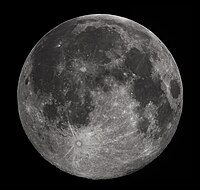
Photo from wikipedia
Abstract Lunar impact crater chronologies have been developed by combining carefully measured crater densities of lunar terrains with radiometric ages provided by returned samples. However, due to the sparse coverage… Click to show full abstract
Abstract Lunar impact crater chronologies have been developed by combining carefully measured crater densities of lunar terrains with radiometric ages provided by returned samples. However, due to the sparse coverage of the samples during the last three billion years, this part of the chronologies is not well constrained. Lunar crater chronologies generally assume that the bombardment rate has been relatively constant during this epoch for all impactor sizes. Nevertheless, evidence has been gathering that this may not be the case for impactors larger than several hundred meters; however, there may be biases related to some of this evidence. The break-up of large asteroids in the Main Asteroid Belt to make asteroid families could be a source of a changing impact flux in the Earth-Moon system, especially when the families form near strong orbital resonances with the gas giants. In order to further explore the state of the impact flux from today to three billion years ago for impactors larger than ~5 km, we calculate crater retention model ages of 43 lunar craters 50 km and larger in diameter (D). Selected craters were initially suggested by United States Geological Survey geological maps of the Moon and Wilhems (1987) to have formed during the Copernican and Eratosthenian. We use the density of small (D
Journal Title: Icarus
Year Published: 2021
Link to full text (if available)
Share on Social Media: Sign Up to like & get
recommendations!